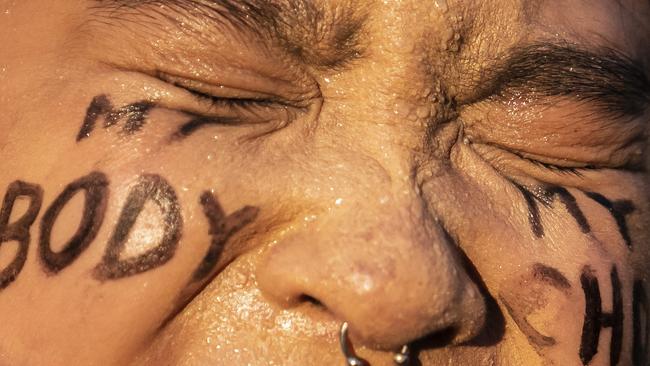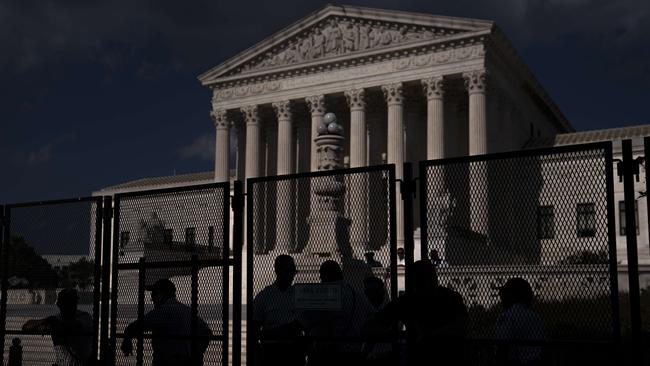Huge abortion law change coming to Australian state after shock Roe v Wade ruling
As the US reels from the bombshell Roe v Wade ruling, attention is turning to big abortion law changes coming to one Australian state in days.

National
Don't miss out on the headlines from National. Followed categories will be added to My News.
America is in turmoil after the Supreme Court overturned a landmark legal decision which granted citizens the constitutional right to access abortions.
Known as Roe v Wade, the ruling had protected women since 1973, until it was sensationally overturned on Friday US time.
It is now up to each individual state to determine whether women can have legal abortions, but so far, 26 states are either “certain or likely” to ban abortions, according to a research group’s findings.
The ruling has been met by shock and devastation across the nation, but as Roe v Wade continues to make global headlines, attention is now turning to abortion rights in Australia – and whether we could ever find ourselves in the same predicament the US is now facing.
Want a streaming service dedicated to news? Flash lets you stream 25+ news channels in 1 place. New to Flash? Try 1 month free. Offer ends 31 October, 2022 >

Abortion in Australia
Firstly, it’s important to note that the situation is dramatically different here than in the US, because we do not have a constitutional right to abortion, or to many other human rights for that matter.
That’s because those issues aren’t expressly mentioned in our constitution, which means it’s the responsibility of the states and territories, although abortions are partially federally funded under Medicare and the Pharmaceutical Benefits Scheme, with drugs used in medication abortion are regulated nationally through the Therapeutic Goods Administration.

The procedure has been decriminalised in every state and territory – although in Western Australia it still falls under the criminal code – with “safe zones” in place around clinics providing abortion services to protect patients from harassment.
It all means that abortion is legal and freely available across the nation – but the rules and regulations do vary from state to state.
Massive abortion law change coming in days
South Australia decriminalised abortion last year, but laws will finally come into effect early next month which will allow abortions until 22 weeks and six days’ gestation without needing to provide a reason.
After that, two medical practitioners must agree that it is necessary.
Doctors are required to provide patients with information about counselling services.
The changes will come into effect on July 7, and will also mean abortion is removed from the criminal legal system and will instead fall under health law.
It comes after the state government moved late last week to finalise the regulations to allow changes to the Termination of Pregnancy Act, which were passed in March 2021.
Health Minister Chris Picton slammed the former state government for stalling on the law change.
“They delayed and buried these regulations and failed to explain to the community why they did not progress them,” he said.
“We have moved forward with these regulations to deliver on what the parliament voted for.”
Here are how the abortion laws in the rest of the country compare.
ACT
In the ACT, abortions are legal and unlike every other state and territory, there is no gestational limit in place.
Abortions must be provided by medical doctor.
VIC
In Victoria, you can legally have an abortion up to 24 weeks of pregnancy at some public hospitals, private clinics, community health centres and some GP clinics.
Abortion after 24 weeks is legal but is not common, and requires two doctors’ approval.
Safe access zones of 150 metres are provided around abortion clinics.
NT
Abortions are legal up to 24 weeks. After that point, two doctors’ approval is needed.
NSW
In NSW, abortions are legal and accessible up to 22 weeks’ gestation.
Abortions are still possible after 22 weeks, but come with some caveats – except in case of emergency – including the requirement of two doctors’ approval.
Doctors are required to provide patients with information about counselling services.

WA
Abortion in WA is legal with the approval of two medical professionals up to 20 weeks’ gestation. After that, a panel of six doctors must agree the procedure is necessary.
Doctors are required to provide patients with information about counselling services.
QLD
Abortions are legal up to 22 weeks’ gestation. After that, two medical practitioners must decide whether an abortion is appropriate.
TAS
Residents can choose to receive an abortion up to 16 weeks’ gestation.
After that point, it is up to two medical practitioners – one of whom must be an obstetrician-gynaecologist – to decide if the procedure is necessary.
‘Terrible example’
While abortion rights are quite clear in Australia, many have argued that Roe v Wade sets a dangerous precedent, and acts as a reminder of just how easily rights can be scaled back.
Last month, Amnesty International pointed out that “there have been many attempts by federal politicians over time to restrict people’s access to safe medical termination” in Australia, citing the example of the RU486 abortion drug which is “still subject to major restrictions due to a deal done by conservative politicians in the 1990s”.
“Any regression in protection of the right to abortion would not only stand to damage the global perception of the United States; it would also set a terrible example that other governments and anti-rights groups could seize upon around the world in a bid to deny the rights of women, girls and other people who can become pregnant,” the organisation argued. “Overturning Roe vs Wade would become the symbol of a major backlash all over the world, putting recent progress at risk and endangering the health and lives of millions.”
Originally published as Huge abortion law change coming to Australian state after shock Roe v Wade ruling





